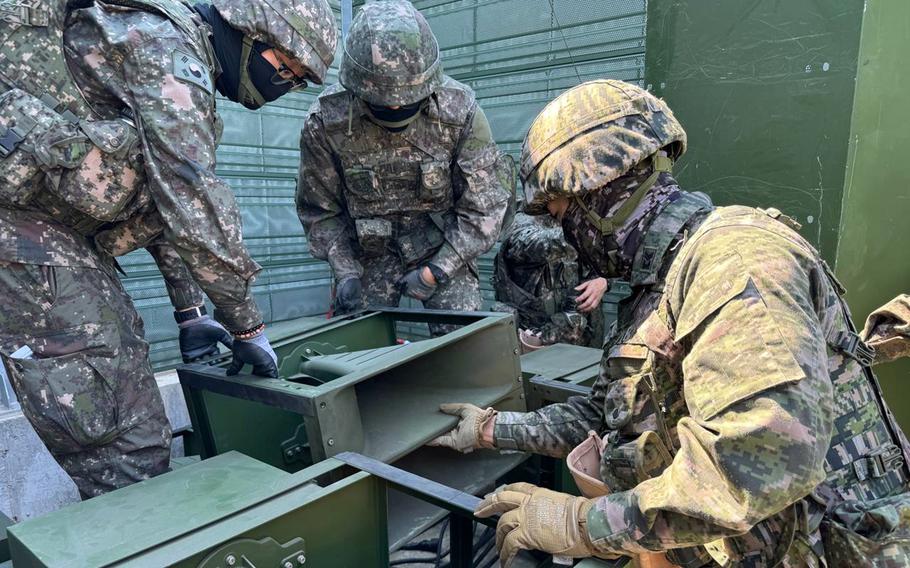
South Korean soldiers inspect loudspeaker equipment at an unspecified location near the inter-Korean border, June 9, 2024. (South Korean army)
South Korea’s military began removing propaganda loudspeakers along the Demilitarized Zone on Monday in a bid to ease tensions with the North, according to the Ministry of National Defense.
The decision is a “practical measure” aimed at reducing hostilities between the two Koreas and will not compromise the South’s military readiness, the ministry said in a text message to reporters that morning.
The move was made without consulting Pyongyang, deputy ministry spokesman Lee Kyung-ho said at a news conference in Seoul.
The loudspeakers are expected to be gone by the end of the week, Col. Lee Sung-jun, spokesman for the Joint Chiefs of Staff, told reporters at the same briefing.
A separate ministry spokesman, reached by phone, declined to disclose how many loudspeakers had been installed along the 160-mile border. Some South Korean government officials may speak to the media without identifying themselves.
South Korea had silenced its loudspeakers along the 160-mile border on June 11. Later that day, the North also ceased broadcasting from loudspeakers on its side of the DMZ.
South Korea’s broadcasts — sometimes aired from truck-mounted speakers — have included pop music, news and local weather reports aimed at undermining the North’s regime.
North Korea’s loudspeakers, which outnumber the South’s, have broadcast monologues criticizing Seoul and its alliance with the United States.
South Korea’s military recently detected static noise from the North’s speakers, indicating that Pyongyang is maintaining its equipment, Col. Lee said.
Before his June 4 inauguration, President Lee Jae-myung pledged to take steps toward thawing frozen ties with the North.
Both Koreas have used border loudspeakers for psychological warfare since the 1950-53 Korean War. South Korea has previously suspended and resumed its broadcasts depending on the state of inter-Korean relations.
Former President Yoon Suk Yeol, removed from office on April 4, restarted the broadcasts in June 2024 after a six-year pause, citing North Korea’s launch of thousands of trash-laden balloons into the South.
Former President Park Geun-hye also resumed loudspeaker broadcasts on June 8, 2016, following North Korea’s fourth nuclear test two days earlier.
Kim Yo Jong — sister of North Korean leader Kim Jong Un and a member of the powerful State Affairs Commission — welcomed Seoul’s silence but said the broadcasts should not have resumed in the first place, according to a June 28 statement published by the state-run Korean Central News Agency.
Based on the lukewarm tone of Kim Yo Jong’s statement, North Korea may not reciprocate by dismantling its own loudspeakers, Lim Sang-soon, an associate professor at Pyeongtaek University, said by phone Monday.
Pyongyang is particularly “sensitive” toward the loudspeakers because many defectors have said the devices are an effective psychological weapon, he said.
“Nevertheless, the decision to demolish the loudspeakers shows Lee Jae-myung’s administration wishes to … improve the relationship between the two Koreas,” he added. “Lee’s administration is expected to continuously pursue détente policies.”